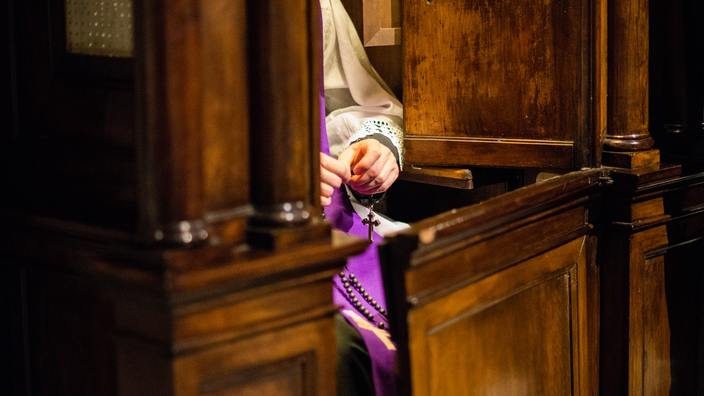Father Pierre Amar is a priest in the Yvelines and an editor on padreblog.fr.
Of course, it is first necessary to know what we are talking about precisely.
Catholics believe in the sacrament of confession, also called "the sacrament of penance and reconciliation".
In a personal meeting with a priest, minister of God's forgiveness, they agree to admit their guilt.
They believe then that the evil they have committed, once confessed and regretted, with the firm intention of not doing it again, gives them the possibility of being forgiven by a God filled with love and mercy.
The priest who hears the confession is bound by absolute secrecy.
The existence of confessional secrecy and its strict observance are enshrined in law (articles 226-13 and 14 of the Penal Code) as in case law.
It is considered a professional secrecy somewhat comparable to that of a doctor or a lawyer.
For the priest, this secret cannot know of exceptions.
But at the time of transparency and truth, the suspicion arises: by the secrecy of confession, priests would they not hide the abominations of some of their colleagues?
If the priest hears a case of pedophilia in confession, can he not break this secret?
This is the whole “art” of the priest to listen and, with patience and pedagogy, to accompany the victim to come out of the secret on his own.
Abbot Pierre Amar
Unfortunately, as often, theory and reality contradict each other. Because we must not kid ourselves: a sexual predator who admits guilt and denounces himself (in the confessional or elsewhere) does not exist! If, however, a penitent confided in such acts, the confessor would immediately return the culprit to his conscience to urge him to regret his acts, to take responsibility for them and to make amends. This does not exempt from facing human justice and may on the contrary allow it. In this sense, confession becomes a possible space where we can reach consciousness and make people think about the scope of their actions.
As a Parisian priest wrote:
“Confession is a meeting which is absolutely free. It is therefore fundamental that the secret is also absolute. Paradoxically, without secrecy, there would be no possible words and therefore no possible salvation. This obligation allows real freedom, real confidence and real progress. Confession is the only place where anyone can engage in complete truth. It is the only place where the individual conscience is really respected and where it can truly be delivered ”.
But if a victim reveals, during a confession, the assault she suffered: can the priest speak about it?
Here again, the confessor always remains bound by secrecy.
It will be the “art” of the priest to listen and, with patience and pedagogy, to accompany the victim to come out of the secret on his own.
This secret of confession favors a path for the advent of truth and justice.
If it did not exist, many victims would not speak and would lock themselves in a logic of guilt.
Abbot Pierre Amar
Actually, I think this secret is really lucky. It promotes a path for the advent of truth and justice. If it did not exist, many victims would not speak and would lock themselves in a logic of guilt. Do not take away from them this place which can be a first step in the liberation of the word! This is what has just revealed the recent testimony of a victim, published in the newspaper "La Croix": abused when he was a young child, an adult was able - protected by the secrecy of confession - to say in all confidence what that was so difficult for him to express. In this sense, can we not think that the secret of confession can participate in the protection of the life and dignity of people?
Let us not forget one thing either.
It is because in the Church there is a penalty for the priest who would violate the secrecy of confession.
And the heaviest possible: excommunication, immediate, without appeal and without trial.
To be relieved of this penalty, it is necessary to appeal directly to Rome, to a special tribunal.
An excommunication is also provided for anyone who divulges the contents of a confession by any means of communication or records it in any way.
Read alsoIs the secret of confession recognized by the laws of the Republic?
In fact, the great ignorance of the Catholic faith surely contributes a little to multiply the fantasies. Those who say, for example, that
"with Catholics, everything is easy: a sin, a good confession and presto… everything is settled!"
in fact simply reveal that they do not go to confession.
What is certain is that it is certainly advisable to strengthen the training of priests to listen to the most serious cases, in order to always better support victims in identifying places and resource persons outside the crisis. confession.
Because confession is an atypical encounter: an encounter with mercy.
As in every sacrament, there is no meeting with the priest, who is himself a poor sinner.
We have an appointment with God there.
And the one who lays the weight of his sin in the confessional is first of all the one who regrets and no longer wants to relapse.
Someone who assumes and wants to get out of it, taking all possible means for it.
Including that of facing the justice of men.

